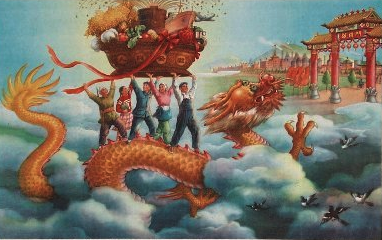About China, Basic Income, and Demand

February 8, 2024
Basic Income is the world’s most Incompetently Advocated Idea.
It is already time for me to blog something new. Something written by the current big guru of Bad Basic Income (BI) in the United States gives me the cue to lay down some points which have been on my mind. They have to do with China, the conflict between a valid and harmful way of thinking about a Basic Income, and the fallacies about ‘consumer demand’.
This person just put out a short paper announcing that China would likely be the first country to introduce a nationwide BI. That is interesting because I have thought the same for some time, but for somewhat different reasons. I do not think China will do this merely in order to increase domestic demand, as this person thinks.
UBI guru, and his acolytes around the English speaking world, are examples of people so obsessed with an idea that they have lost touch with reality and are deluding themselves. They keep holding up government programs such as Alaska Permanent fund, or the Canadian Child Benefit, as examples of a UBI. They are no such things.
They are obsessed with UBI “pilots” and “experiments” all over the world. They do not realize that these pilots are cheap ways of keeping a certain type of social advocates occupied, and attention diverted away from serious economic reforms. All these experiments either show nothing, or are actual failures, but the UBI true believers read into them what they want.
The experiment in Otjivero, Namibia, had in fact a quite bad outcome. Initially, giving everyone in a small, isolated, impoverished community was a benefit. Then people started pouring in from elsewhere to take advantage of the new prosperity, and huge social problems developed.
A new wave of interest in UBI began in the Anglosphere after about 2015. At that time some elements in the billionaire class became interested in it. They began encouraging the wrong kind of UBI advocates, but cunningly avoided seeming to push too hard for it.
Also at that time, however, some good economists, especially ones from the left, took a good look at the UBI idea. They explained that this was an idea which was not going to work under capitalism. If it was applied, it would become a trap for working people, forcing them more tightly into job and housing ghettos, and restricting other services.
Most UBI advocates simply denied these objections without any serious attempt at refutation, or just ignored them altogether and kept marching down the road to nowhere. The real problem with most of these people is they are locked into liberal ways of thinking. They cannot conceive of some other system than capitalism, or of its presumptions.
Some people, including me, remain interested in the idea of a UBI but also acknowledge the need to move on from capitalism. Not all are the dogmatic squareheads who think communism has to be Soviet Union 2.0 but this time we’ll get it right.
UBI post capitalism
Whatever you want to call it; communism, state socialism or post capitalism, it will be essential before a UBI system can work. When you live in capitalism, you live in capitalism, and a UBI works against the logic of capitalism. This is about extracting value from the labor of workers.
Reality is this; for awhile in the golden age, the productivist era, capitalism was somewhat curbed and living standards rose. Since 1980, we have lived in the neoliberal age, with capitalism again ascendent. Services and living standards have been gradually rolled back.
Extracting surplus value from workers means just that. In the neoliberal age, rents are always a little more than people can pay, wages always a little less than people can live on. You can be sure that UBI will always be a little less than people can survive on.
UBI is an idea for post capitalism. It has to be talked about in post capitalist terms. The paper I wrote back in 2014 explains this.
Some people say that because of this, we should forget about UBI or talk about it again after capitalism has ended. I say that, while we can forget about a good form of UBI until the post capitalist era, we need to keep talking about a UBI.
Some hard head reds think we should not try to plan the future until capitalism is overthrown, and we will wing it from there. I say that a post capitalist system needs to be fully worked out beforehand. A UBI needs to be an integral part of such a system.
When you end capitalism, you end capitalism and with it the capitalist rentier class. You take the surplus value that has been going into dividends to provide income for the rich, and you apply it to benefit society. That would of course be done through taxes on surplus wealth and definitely not through any kind of income tax.
That will become possible when the capitalists have been overthrown. Until then, we can enjoy life under terminal stage capitalism. A UBI funded by economic surplus would be one of the selling points for a post capitalist world, along with public land trusts and public banking.
Until then, rather than a UBI, it would be better to advocate for various taxes which would lay the foundation for a post capitalist world and a UBI which would actually work. That is; land value taxes, value added taxes, inheritance taxes, or excess profits taxes. Income taxes should be gradually eliminated, along with every program run on tax rebates.
A UBI cannot be funded through an income tax system. I have pointed this out. So have some other critics.
Income taxes were designed to insure that most of the cost of social programs are paid by the working class. As the costs have increased, income taxes have been crushing the working class. The whole idea of distributing the benefits of productivity through wages and salaries, mediated by the tax system, will gradually crush any economy.
Dibao and UBI
People are misinformed about China in different ways. Some people see China as having become a capitalist country and think this is great. Some people see it as a betrayal of communism, turning back to capitalism.
Some people, like me, see it as communists finally getting communism more or less right. Micromanaging everything was not the right idea. It was always a matter of getting rid of the capitalists and creating state banking systems.
China has also made progress on political communism. It has been developing a meritocracy. It still has problems with corrupt elites and abuses of power.
The big problem with China is that it did not have much to go on when it first set up a socialist system. It started out with a Soviet style system and when it incorporated free market methods, it had only western models to go on. It still has some problems with its tax system, especially use of income taxes, which will complicate initiating a UBI.
However, much of China’s state revenue comes from the profits of state corporations. This means it is already almost there in capturing surpluses to be put back into capital development and maintaining basic demand. China should get as close as possible to taking 100 percent of ‘economic’ profit; meaning all profits over normal profit. I will explain this concept below.
In China, all land title rests with government. Most local government revenue is from ‘sale’ of land, which actually means sale of long term leases. This is essentially the system we need in the west, with land held in land trusts and land banks.
Thus China has in place what it needs to launch a proper UBI. What it presently has a system called Dibao, as the UBI guru has discovered. It is not a proper BI because it is not universal.
It is a classic ‘poverty trap’ type of arrangement. Recipients are able to apply for it if their income falls below the average income for the district.
They get a top up from the local government to bring them up to the line. If they make any other money, the dibao is withdrawn by that amount. Thus there is no incentive to do any part time work or to regain employment and leave the dibao system.
The dibao has been around from Mao’s time but never really worked. Local governments had to pay it from their own limited revenues. Applicants have to go through a ridiculously complex process, and continuing paperwork.
The real welfare system in China has been the extended family. Most of the population had remained rural until recently. The Chinese have reduced poverty until now largely by industrializing and creating paid employment.
Object of growth
Now China’s era of rapid growth is ending. It is reaching the limits of how it can improve living standards just through employment. It is starting to discover two things I have long said and which capitalist economists are incapable of admitting.
First, there is no way to keep everybody employed full time. Some people cannot work or are just no good at work. There has to be a reserve capacity in any system, which means the full workforce is not needed all the time.
Second, if you start raising the incomes of the best workers so they can buy more stuff, pay more for housing, and pay more taxes, they begin to be uncompetitive. Fewer people can be employed. This starts the vicious cycle which has wrecked Western economies.
When sagacious people ask UBI advocates what they should be asked; what exactly is the problem for which UBI is the solution, this is what the answer should be. Right now UBI people do not have a really good answer. The real point of UBI is to solve this jobs versus incomes problem.
To live, people require a steady, predictable, and adequate income. To function, an economy requires a cheap, flexible workforce, with a substantial ‘on call’ force. Yet it also needs a steady, reasonably predictable consumer demand.
What a UBI, when funded by the surplus generated by economic activity, would do is to mediate these conflicting needs. A socialist economy with UBI would be stable, but competitive. Employment would be very high and demand would be steady and predictable.
There are two points which should be made about this, about economic ideas we need to discard, before a UBI will work.
First, raising people’s incomes is the wrong aim. That creates a race between income and living costs which income will always lose, and which slowly wrecks an economy. It is about reducing people’s cost of living.
Second, you do not want increased consumer demand just for the sake of creating demand. You do not want to create artificial demand. You do not want to create shit that nobody needs, made to be thrown away.
You do not want growth just for the sake of growth. The logic of capitalism requires it to keep growing or it collapses. This it creates waste and destruction of resources.
A socialized economy, on the other hand, can ‘right size’ itself. When organized correctly it conserves resources and creates little waste. Yet it meets all real needs and keeps ahead of technological advance.
Cheap Fixes
China has the most advanced economic system in the world. It is the model other countries are increasingly following as the power of old oligarchies is overcome. Thus it is logical to expect that it will be the first country to introduce a UBI and do it right.
Countries such as the USA and Canada are still locked into late stage capitalist, neoliberal economics. It seems a part of our oligarchy has the idea that a UBI will be a cheap fix for this failing economic system. The way these oligarchs talk, and with many UBI advocates these days parroting them, we know what kind of UBI system we would get from them.
What they want is techno feudalism. They envision a technical managerial class which would manage their control of all essential services. The UBI would be about maintaining at minimal cost a large part of the population they do not want to employ anymore.
What is really ironic is, they think they will just get everything from China. They will not have to deal with workers. They can pay a UBI just big enough to keep the surplus population alive.
These people are really not so intelligent. They are merely powerful. They do not see the connection between incomes and consumer demand. They will not be powerful for much longer.
Comparison
I have now prepared the ground to go after UBI Guru’s paper about a UBI in China. His big problem is he needs to get his head out of the two echo chambers it is stuck in. These are; the the American UBI cult type movement, and American ‘biz news’.
I can skip over the ideas he has about the origin of the UBI concept. I can quickly dispense with his adherence to ‘liberal democracy’, the biggest oxymoron in the world, and the ideas coming from that. China is anything but an ‘authoritarian’ state and launching a UBI would be anything but a one man decision.
So, China’s median disposable income for urban areas is $7200 American, compared to $45000 in Uncle Sam? There is no concept of purchasing power parity (PPP) here. The World Bank, not the most unbiased authority, gives China, rural and urban combined, a PPP to the American dollar of $18800.
The world bank figure does not take into account services which Chinese get for free that Americans pay for. Comparing actual living standards is very complicated and subject to biases. Yet the average Chinese has a material standard of living not much below the USA, Canada, and other western countries.
China now has three and a half times the USA industrial capacity, so it is questionable what the income of Americans is based on.
A normal economy
A UBI would be very feasible financially for China. The key is that its economy is mainly state owned. Its government has been looking into ideas for income distribution and a solution for this ‘consumer demand’ problem.
China has plenty of room to increase state revenues without impairing the living standard of the population or the global competitiveness of its export enterprises. A UBI would still be a significant new expense. It would be only partly offset by the increased revenues it would generate.
China has the three really important things which would make a UBI viable in the long term. Canada in particular does not have these things. This is what really makes UBI unfeasible in Canada.
China has a logical system of housing, with a large housing surplus, which would prevent capture of income by landlords and speculators. It has a reasonable system of labor laws, with strong unions, which insure employees a fair wage but prevent wage inflation which would harm business competitiveness. It has a stable population which does not depend on mass immigration, and so can raise living standards.
In China most of the economic profit from state enterprises becomes government revenue. Relative to western economies, a small and declining share of the surplus is going to a rentier or investor class. Investment capital for critical industrial expansion comes from new money created and issued by state development banks.
An economy is a kind of organism or system which produces far more than the sum total of all individual efforts. Like any organic system from a bean plant to a power plant, it needs a surplus in order to function. This surplus must be used up somehow.
A brilliant, misunderstood, and generally dismissed economist pointed out that the surplus in an economy is in the from of an ‘economic profit’. This is the difference between the ‘normal profit’ of an enterprise and its total profit. The normal profit is the ‘opportunity cost’ of the capital invested in the enterprise.
The opportunity cost is what the money would make if it were applied to something else, or just left in a bank collecting interest. In a well run economy, everyone is making no more than a normal profit. Anyone making an ‘economic profit’, is taking advantage of something.
These concepts will flip out any adherent to capitalism and present day economic orthodoxy. Readers should not be overly worried if they do not grasp these concepts. Chinese economists seem to understand them.
Funding UBI
Many of the present senior members of China’s government do not like the idea of a Basic Income. They do not want to see people get ‘something for nothing’. This is a little disappointing because they are so advanced on so much else.
This is the old ‘reciprocity’ idea again. Everyone should put in what they take out. But we are not living in the neolithic age and the point of an economy is that everybody gets far more out than they would ever put in.
Some Chinese government think tanks are examining the idea of creating a guaranteed income type of program using dividends from state enterprises. Certain households will be given shares in these enterprises, and can receive the dividends as income. Alas, this seems like a new version of the ‘dividender’ fallacy which UBI advocates keep falling into.
A UBI or guaranteed Living income must be geared to an objective calculation of living costs, adjusted to inflation. It cannot be based on some subjective and fluctuating valuation of some asset like stock shares or resource prices. It must be funded by the central governments sovereign power to issue the currency.
To apply a UBI effectively, China still needs to overhaul its tax system. It needs new and effective wealth taxes. It needs to rely less on land and income taxes. The aim is to more efficiently capture the surplus from economic activity.
It is important here to understand rightly the relationship between government taxation and expense. Government does not need to raise money from taxes. It can issue whatever money it needs. The point of taxes is to take this money back out of the economy to prevent inflation and speculation. It is to recapture the surplus from the system and apply it to maintain growth and living standards.
I am sure these concepts will explode the heads of present day orthodox economists, as well as libertarians. Many people will find it incomprehensible without much further explanation. But I should end my efforts at being an economist at this point.
Taking it easy
I will conclude this by quickly rebutting two more ignorant points which UBI guru makes.
First, the idea that a UBI in China could be passed just by convincing “one man”. This is the assumption that China is a totalitarian dictatorship. It shows total ignorance of the complex, meritocratic system of govern China has developed.
Second is the idea that ‘slow’ consumer demand is a problem and UBI is a solution. This turns on the different way people in China and North America have reacted to the trauma of the covid epidemic. Also, on the productivist ideas which still prevail in both Chinese and western leadership.
North American ‘consumers’ have gone on a consumption binge, using credit; money they do not have. This suits financial managers and government. It is not sustainable.
In China, people have decided they want to take life easier. They are consuming less, saving more, and looking for shorter work hours. This concerns Chinese managers, but they are slowly coming around to the idea that this may be a good thing.
There seems to be no basis to the claim that Chinese government believes a UBI would increase consumer spending. With even more security provided by a UBI, the Chinese may actually decide to take life even easier.
This would not be a bad thing. Reality is that working just for the sake of working is pathologic. People should work in order to live, not live in order to work.
Productivism, the idea that people need to work and spend just to keep the economy humming along, becomes counterproductive once productive capacity has been fully developed. The object should turn to maintaining a good living standard for everyone with the least use of resources and the least effort. It is my opinion that a UBI, done correctly, would have this effect.
I believe the Chinese leadership are on the way to figuring this out. In North America, we are on our way to a collapse. A UBI would likely make it worse.
Why? That is a topic for another blog.






Comments ()